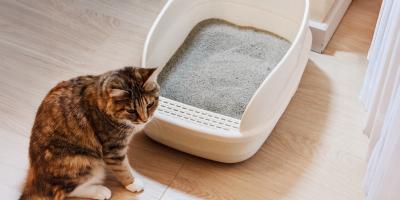Cat Not Using the Litter Box: Causes & Solutions


If your cat is not using the litter box, there can be several reasons for this problem. Whether you have a new kitten or a senior feline, cats are sensitive to change. Their surroundings and many other factors can affect their relationship with the place where they “do their business.”
Determining a cause can be challenging because, according to Purina animal behavior scientist Jean-François Savard, Ph.D., “There’s not a one-size-fits-all answer.”
Cat Not Using the Litter Box All of a Sudden
If your cat or kitten is not using the litter box, here are some potential causes and solutions to consider:
Health Problems
If your cat suddenly starts eliminating in other areas of your house, a health issue could be to blame. According to the American Society for Prevention of Cruelty to Animals (ASPCA), common causes include a urinary tract infection, Feline Interstitial Cystitis and kidney stones.
Solution: Dr. Savard recommends checking with your veterinarian. “Once you rule out a medical problem,” he says, “then it is easier to look at other things.”
Litter Box Overcrowding
When it comes to litter boxes, cats don’t like crowds. If you have multiple cats, too many of them trying to use the same litter box can cause problems.
Solution: “The rule of thumb is the number of litter boxes you should have should equal the number of cats, plus one,” advises Dr. Savard. So, if you have two cats, for example, you should have three litter boxes available for them to use. Also, these boxes should be spaced out. If they are too close to each other they can be treated as one box.
Litter Box Location
Like people, cats prefer a bit of peace and quiet when they go to the bathroom.
As an example, Dr. Savard says that while the laundry room might seem like a good “non-public” space to hide a litter box, your cat might not feel comfortable with the noise of a running washer and dryer. If this is the case, the litter box may go unused.
Solution: Be sure to put litter boxes in quiet areas with fewer obstacles and less traffic. Also, if a cat develops a negative association with an area where the litter box is placed due to a negative experience, you may need to find a new home for that box if you want them to continue to use it.
Cleanliness
Cats prefer clean litter boxes, but in multi-cat households this may be less about the presence of odor from other cats, and more about elimination “obstacles.”
In fact, a study funded by Nestlé Purina on litter box appeal in multi-cat households demonstrated the physical obstructions created by cat waste in litter boxes, and not odor from that waste, determined litter box preference in multi-cat environments.
Solution: If you want your cat (or cats) to use your litter boxes, keep them clean.
Box Size & Litter
Other reasons a cat might start eliminating outside the litter box could have to do with the box itself.
“One thing to consider,” according to Dr. Savard, “is whether your cat might not be aiming well because the box isn’t big enough, or the sides of the box aren’t high enough.”
Solution: Try switching to a larger box with higher sides.
The type of litter may also play a role. Cats may prefer different types of litter and these preferences can change over time.
Solution: If you’ve recently switched the type of litter you use, you may need to switch back to the one your cat prefers.
Environmental Stress
Any of the above issues could cause your cat stress, which can affect their relationship with the litter box. Stress can also result from changes in their life or environment, such as a move to a new home, someone special moving or passing away or the addition of another pet to the family.
Signs of stress can be more varied than improper elimination. Dr. Savard recommends looking for:
- Changes in habits or actions
- Reduction in appetite
- Sleeping in unusual areas
- Asking for attention in different ways
- Changes in vocalization
- Hiding more
Solution: Try some extra affection and attention. Your cat may also need the comfort of more consistency in their environment.
Senior Cat Not Using the Litter Box
If your senior cat is suddenly not using the litter box , and there have been no changes to their environment, an age-related health issue may be the cause. An aging body and arthritis can prevent cats from accessing or entering the litter box.
Solution: As with any suspected health issue, contact your veterinarian for guidance.
How Do You Get a Cat to Use the Litter Box?
When bringing a new cat into a home, Dr. Savard tells owners to “create a small, quiet space with a litter box and items like a scratching post. Put the cat in the litter box so that they know where it is. They should have a desire to go in that clean litter box when the need arises.”
For a cat experiencing stress due to a move or other trauma around a certain location, try confining them to a space with their own litter box and food for a few days, then gradually introduce them to the rest of the house. While they’re getting used to the change, make sure to give them extra love and attention.
Get more cat litter box tips from our experts, or visit our Pet Expertise page.

Unlock Cat Health Insights with Petivity
The Smart Litter Box Monitor tracks your cat’s litter box behavior & weight—and alerts you when changes could require a vet visit.






